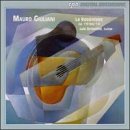BRAVO MAESTRO!!!!!!!!!
Juan Ortega | Chile | 03/12/2006
(5 out of 5 stars)
"Excepcional!!!!!!!!!
En esta grabación el maestro Luis Orlandini revela una extraordinaria musicalidad y espiritu guitarristico a través de una interpretación llena de virtuosismo, energía y sensibilidad. Realmente le da vida y un sentido muy especial a cada una de las seis Rossinianas. Creo que el maestro además tiene una concepción muy particular de la obra en su contexto global, y nos muestra las Rossinianas en su conjunto como una obra maestra. Los que hemos tendio el privilegio de escucharlo en vivo podemos dar fe de ello.
Definitivamente Luis Orlandini es el mejor interprete de esta obra, y posiblemente sea el mejor interprete de Giuliani y de Fernando Sor (los invito a escuchar el CD "Fernando Sor: Fantaisies" que sin duda es la mejor grabaci?n que existe de la obra de Sor).
"
The Parnassus of Guitar Literature
Joseph Barbarie | new haven, CT | 02/24/2008
(4 out of 5 stars)
"The problem with the guitar has always been one of dimension, both in an absolute and a relative sense. That is, it has neither the volume nor the dynamic range of even the earliest pianofortes (and some harpsichords). At best, it holds its own against the meek little clavichord, hardly a blockbuster of an instrument.
This is a simple mechanical problem; you can't play as loudly on an instrument with six single nylon (or gut) strings as you can on one 70 or 80 double- or triple-wound steel strings, with soundboard and case ten times larger. That's a simple fact of acoustics.
What can be done on a guitar, however, are pull-offs, slides, vibrato, etc., and other timbral effects (harmonics, palm-muting, rasguiendos) that are impossible, at least on the standard modern Steinway-type concert piano. Many composers (particularly later romantics, such as Tarrega, Albeniz, and Granados) made use of these guitar-specific techniques, and created an idiom-rich vocabulary for the guitar.
Giuliani's art, however, dates from the very beginning of the guitar literature, before some of these technqiues would have come into vogue, and as such, is a "purer" sort of animal. Here, the guitar is still trying to challenge the piano on its own turf. Therefore, the concern is more with fullness of texture, multiplicity of voices (contemporaneous, and comparable, piano composers would be slightly lesser lights like Hummel, Weber, Moscheles, or Field). Beethoven had very little interest in the operatic world (particularly that of Rossini).
Giuliani, a personal friend of Rossini, has a melodic sensibility that owes everything to early romantic Italian opera, even in his own works. Here, though, the melodic material is all transplanted from Rossini's operas. Each individual Rossiniana consists of a melange of material from several of Rossini's operas. No. 3, for instance, quotes from "La Donna del Lago," "Turco in Italia," and others.
At every turn, Giuliani's handling of the material shows his quasi-pianistic vision (or ambition) for the guitar. The melodic voices are put in the very top register of the instrument, then moved down to the middle, then to the bass. Accompaniment or decoration is almost always present as or two more voices. The effect is dazzling, three-dimensional, kaleidoscopic, anticipating what later piano virtuosi like Thalberg and Liszt were to do -- to still greater degree -- in the 1830s with their operatic transcriptions and fantasies.
The player here, Luis Orlandini, is not familiar to me (outside of this disc). His playing is brilliant, his technique is sure and easy. His instrument also has a bit of more of a "period" character than the other recording of Rossiniana I own (on Arts by Ricardo Zigante). That is to say, it favors the treble voices a bit, but gives each one quite a bit of articulation and detail in the overall sonic picture.
There is also some confusion as to opus numbering between this set and the Arts label's edition. CPO lists these as Op. 116, nos. 1-6, whereas Arts has individual opus numbers for each Rossiniana (no. 5, for instance is given as Op. 123, and no. 6 as Op. 124). I have no idea which is correct.
As a final aside, ignore the nose-holding review of Amazon.com's own Leslie Gerber above. Her description of this music as "light" is enough to suggest a lack of qualification to review such a disc. Her unfamiliarity with themes from Rossini's operas only confirms it."


 Track Listings (3) - Disc #1
Track Listings (3) - Disc #1